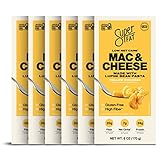Are you confused about whether can you use almond milk in mac and cheese? So yay, you’re in the right place. Here your all doubts will be cleared.
Page Contents
What is Almond Milk And How Does it Differ From Regular Milk?
Almond milk is a vegan milk substitute that is created by mixing almonds and water, then filtering the result to get rid of the solids. For people who are lactose intolerant, vegan, or have other dietary requirements, it is a well-liked dairy-free choice.
The source of the milk is the primary distinction between almond milk and ordinary milk. Unlike ordinary milk, which is manufactured from the milk of cows or other mammals, almond milk is created from almonds. This also implies that almond milk has fewer calories and fat than ordinary milk and is devoid of lactose and cholesterol.
Compared to ordinary milk, almond milk has a milder flavor and a thinner consistency. It can be taken on its own or in place of ordinary milk in recipes. Almond milk does not, however, have the same nutritional profile as ordinary milk since it contains less protein and calcium. Check the label before buying because many commercially available almond milk products are additionally sweetened with additional sugars.
Mac And Cheese – The Classic Comfort Food
Every age group enjoys the traditional comfort dish of mac and cheese. It is a macaroni and cheese meal that is commonly prepared on the hob or in the oven. Pasta and cheese were mixed to make a straightforward and filling dish in Italy in the 14th century, and this is where mac and cheese got its start.
When Fannie Farmer included mac and cheese in her first cookbook, which was released in the late 1800s. The dish gained popularity in the United States. Being an inexpensive and satisfying dinner during the Great Depression, it rapidly became a staple in American families.
Nowadays, mac and cheese is still a popular dish that may be prepared in different ways. Some recipes include several kinds of cheese. While others use other ingredients for taste and texture, such as bacon, jalapenos, or breadcrumbs. A creamy sauce can be made using items such as nutritional yeast, cashews, or tofu in vegan and dairy-free mac & cheese recipes.
Mac & cheese is a timeless comfort meal that may be prepared on the stovetop or in the oven.

Can You Use Almond Milk in Mac And Cheese?
Yes, you can make mac and cheese with almond milk instead of conventional milk. Almond milk, which has a thinner viscosity than ordinary milk, may lead to a somewhat thinner sauce. Therefore it’s crucial to keep that in mind. Use a thicker cheese, such as cheddar or gouda, to make up for it and/or increase the amount of flour in the roux to help thicken the sauce.
To minimize any undesired sweetness or taste when using almond milk in mac and cheese, it’s also crucial to use an unsweetened and unflavored kind. Also, it’s crucial to exercise caution and pick a milk substitute that is safe for you if you have a nut allergy.
Can it Harm When You Use Almond Milk in Mac And Cheese?
Although almond milk is a popular dairy-free substitute for normal milk. It is typically acceptable to use in mac and cheese recipes. It’s crucial to keep in mind that almond milk has a slightly different flavor and consistency than conventional milk. Which might have an impact on how your mac and cheese turns out.
Almond milk has a thinner viscosity than conventional milk, which might lead to a thinner sauce, which is one possible problem with using it in mac & cheese. To prevent this, you could wish to increase the amount of flour in the roux or use a thicker cheese to aid in the sauce’s thickening.
Additionally, if you have a nut allergy, it’s important to avoid using almond milk in your mac and cheese to prevent any adverse reactions. It’s always best to consult with a healthcare provider. If you have any concerns about the safety of using almond milk in your diet.
Pros And Cons
Here are some potential pros and cons of using almond milk in mac and cheese:
Pros:
- Almond milk is a suitable substitute for conventional milk for those who are lactose intolerant or vegan. Or have other dietary limitations because it is a dairy-free option
- Almond milk has less fat and calories than ordinary milk. Which may be advantageous for people trying to cut back on their calorie consumption
- Almond milk gives mac and cheese a little nutty flavor that can improve the overall flavor of the food
Cons:
- Regular milk has a thicker viscosity than almond milk. Which might lead to a thinner sauce and change the mac and cheese’s overall texture.
- As almond milk contains less protein and calcium than ordinary milk, it does not have the same nutritional profile. Those who want to consume more calcium and protein may find this to be a worry
- Certain commercially available almond milk varieties are sweetened with extra sugars, which might change the mac and cheese’s overall flavor and introduce unwelcome sweetness
Overall, individuals seeking a dairy-free substitute or those managing their calorie consumption. It may find that using it is a suitable option. However, it’s important to keep in mind the potential differences in texture and nutrition compared to regular milk.
Can You Use Any Other Non-Dairy Milk Alternatives For Mac And Cheese?
Yes, many non-dairy milk alternatives can be used in mac and cheese. Some popular options include soy milk, rice milk, oat milk, and coconut milk. These alternatives can have varying levels of sweetness, thickness, and flavor, so it’s important to choose the right one for your recipe.
Soy milk is a popular choice for dairy-free mac and cheese recipes. As it has a similar consistency to regular milk and a mild flavor that doesn’t overpower the cheese. Rice milk and oat milk are also good options, but they tend to be thinner and sweeter than soy or regular milk, so you may need to adjust the recipe accordingly.
Coconut milk is a good option for those who like a slightly sweet and creamy mac and cheese. However, it has a distinct coconut flavor that may not be suitable for all recipes.
When using non-dairy milk alternatives in mac and cheese, it’s important to choose an unsweetened and unflavored variety to avoid any unwanted sweetness or flavor. Additionally, if you have a nut or soy allergy, it’s important to use caution and choose a milk alternative that is safe for you.

Final Thoughts – Should You Use Almond Milk in Mac And Cheese?
In the end, it comes down to dietary requirements and personal tastes whether or not to use almond milk in mac and cheese. For people who are vegan, lactose intolerant, or allergic to dairy, almond milk can be an excellent substitute. It can give the food a little nutty flavor and a creamy texture.
Almond milk may not be everyone’s cup of tea or they may feel that it doesn’t have the same amount of smoothness as conventional milk in mac and cheese. Almond milk might not be a good choice for people who have nut allergies either.
If you want to try almond milk in mac and cheese, you should experiment to discover the correct proportions of components and tastes. In addition, several other non-dairy milk substitutes are readily accessible and can be used in mac and cheese recipes, including soy and oat milk. In the end, you should select the milk that best suits your nutritional requirements and personal taste preferences.
- Big Mac Tacos | And The Recipe To Try
- Homemade Healthy Mac and Cheese Recipe to Make
- Substitute For Panko | The Best Information
- The Best Pancakes with Almond Milk Amazing For You
FAQs
No, it is not recommended to use sweetened almond milk in mac and cheese. As it may alter the taste and make the dish overly sweet.
Yes, you can use almond milk in baked mac and cheese. However, you may need to adjust the recipe slightly to ensure the dish doesn’t become too dry or overcooked.
Almond milk is lower in calories and fat than regular milk and is a good source of calcium and vitamin D. However, the nutritional benefits will vary depending on the brand and type of almond milk used.











